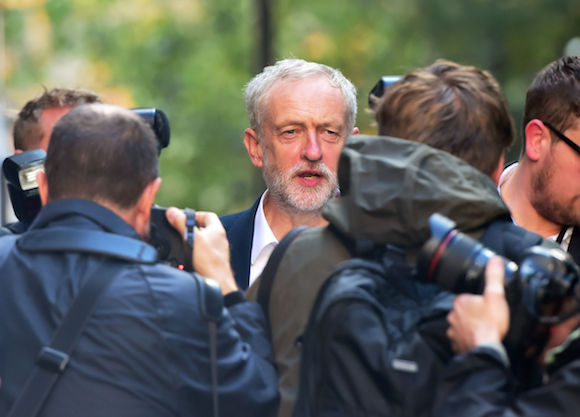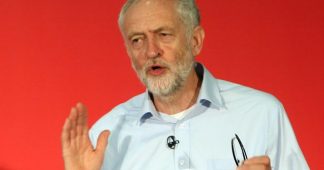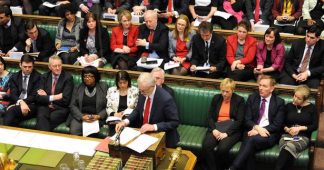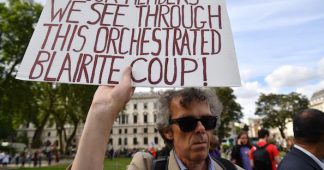This past summer, I was hoping to meet with Jeremy Corbyn at a conference on anti-crisis policy in Ufa, Russia. He asked for a few days to think over the invitation to attend, promising to do so unless something unplanned and significant happened. It did. He was nominated for the leader of the British Labour Party.
“The phenomenon of Corbyn” arose suddenly, not only for himself and for all who knew him, but also for many journalists and analysts, including those in Great Britain. Indeed, the modest backbencher MP has never attracted too much attention. Rather, he was known as one of the few people in British politics who was not interested in money and a career, and therefore has always remained in the background since the early 1980s when he was first elected to parliament. Of all the deputies in Westminster, he was the most beneficial for British taxpayers because he spent public money sparingly and did not abuse his privileges. But he repeatedly won renewal of his electoral mandate simply because people in the district he represented firmly knew that Mr. Corbyn would meet their expectations and solve minor problems with the use of his status and influence.
Because of his strong position in the county, Jeremy Corbyn was independent from both the party apparatus and media. This allowed him to win elections without spending a lot of money. This independence from authorities slowly turned him into a famous politician, if not a dissident of his own party. Although Mr. Corbyn did not preach heretical opinions. He simply remained faithful to the principles of social democracy at a time when all other high-ranking politicians betrayed their party principals and turned into neo-liberals.
It’s funny to read today in our Russian press (and in the Western press) about Corbyn as the representative of the “hard left”. Both his program and his activity do not go beyond what was considered as a normal social democratic agenda during the 1970s and 1980s. Of course, in its left-wing, not right-wing, expression. But not more than that.
The accusation against Mr. Corbyn of extreme radicalism speaks more about the shift of European and British politics closer to a right “axis” than about the shift of views of MP Corbyn his supporters. But sometimes, adherence to principles can be good advertising. Especially when others betray and sell out, it is quite possible to be glorified based on the sole fact that you behave decently.
Mr. Corbyn spoke at anti-war rallies when his Labour Party was silent or when it supported the war in Iraq. He did not admire the feats of NATO’s special forces in Afghanistan. He told his listeners about the arson of the House of Trade Unions in Odessa, Ukraine on May 2, 2014 while the British media was stupidly repeating the version of Kiev propagandists about “quilted jackets” (pro-Russia “losers”) who set themselves on fire, or pretended that nothing happened at all. He talked about the bombing of Donbass when it was expected that leaders would only worry about the journalists of Charlie-Hebdo. All these facts allowed the media to project the image of a “pro-Russian” politician, although, by and large, Mr. Corbyn does not care about Russia. Rather, he cares about the West’s responsibility for the chaos that is growing in the world. He is not a supporter of the current Russian government; Mr. Corbyn simply understands that Russians, like everyone else, have legitimate interests which should be taken into consideration.
In terms of intra-British debates Mr.Corbyn usually was right in spite of the opinions of official leaders. When he spoke about the crisis of financial capitalism, which cannot be overcome with austerity measures, and predicted that the privatization of the railways would make them less effective but more expensive, profound experts rejected his arguments with an air of importance. Nevertheless, everything happened exactly as he said.
People kept this in mind, year after year. The authorities still consisted of gentlemen who lied every time, failing and turning democracy into a farce. Society was becoming more and more irritated but kept on bearing it.
Gradually in the British Parliament, Mr. Corbyn built a reputation as a good interlocutor with whom it was not acceptable to agree but to whom it was necessary to listen. This reputation determined the unexpected twist in his political career; which can, in its turn, become the beginning of a breaking point in the political process in all of the United Kingdom and maybe even in all Europe.
After the Labour Party was once again shamefully defeated in 2014 by the Conservatives headed by David Cameron – who were, in fact, doomed by many to fail as demonstrated by polling surveys – it became clear that changes in the Labour Party were inevitable. The leader of Labourists, Ed Miliband, resigned; the election of a new leader was declared. This is one of a few good English traditions – a politician who fails an election must leave his or her post and not occupy it until death. However, the responsibility for another failure lay not on Ed Miliband (by the way, he is the son of the famous Marxist historian, Ralph Miliband) but on his entire party leadership, who were not planning on quitting or changing anything.
A usual set of representatives of the Labour Party elite ran for the party leadership. They were faceless and unprincipled people, who differed little not only from each other but also from their conservative opponents. The election could have turned into a deadly dull and, frankly, pointless spectacle. But then one of the deputies proposed to nominate Mr. Corbyn, just to make things a little more interesting. He was, at least, a good speaker; at least a debater who could say something constructive amidst the usual banal utterances.
The fact that Mr. Corbyn could not only diversify the dull process of the party election but also become a leader was unexpected for everyone, including the candidate himself. He did not have influential supporters and money, not even sympathizing journalists capable of creating an “image” for him. But when he was put on the list, he set to work with his usual due diligence. He began to visit cities of the United Kingdom, made speeches and discussed the country’s situation with people. These meetings gathered crowds of many thousands. And then thousands of people began to join the Labour Party in order to take part in the selection process.
It should be noted that the procedure for the leader election has recently been greatly democratized. At one point, the Labour Party leader was elected by MPs in Westminster who would consult with the leaders of the largest trade unions. Paradoxically, this situation was changed by right-wing leaders. With the intent of reducing the influence of trade unions and backbenchers, they started relying on ordinary members and eroding the existing system. Decisions ended up being made by the party apparatus, which made them legitimate, referring to the will of some group of members that existed only on paper. Primary organizations collapsed and citizens became the formal support of managers whose political activity consisted of transferring every few months some fixed amount of money to the party. Meanwhile, activists in the labor movement and among left-wing youth left the party, seeing no point in their activity. In addition, the number of workers who once formed the support of social democracy was steadily declining. Their places in the party were occupied by representatives of moderately liberal middle classes who were interested in politics, but not interested enough to be taking active part.
The trouble is that this mechanism is very convenient for political manipulation but completely unprotected from outside intrusion. Moreover, no one even thought that someone would try, once again, to revive the grassroots of the party to fight for workers’ rights. In the 1960s and 1970s, similar revival attempts were constant and the apparatus fought with them strictly (the frankly undemocratic procedure for electing the leader was expressly implemented in order to prevent any influence on the managers’ policy). But since the days of Tony Blair, these extremes were so deeply forgotten that precautionary measures were disabled.
By mid-August 2015, Mr. Corbyn firmly led the race and party memberships were growing by leaps and bounds. Veterans, frustrated with many years of treacherous politics of right-wing leaders, were returning, youth joined and people who have recently thought about parliamentary politics as hopeless were engaging. Paradoxically, the financial position of the Labour Party dramatically improved, but for some reason this did not please the party’s management.
The party elite began to take counter-measures using the media. The British press launched a campaign against Mr. Corbyn which, incidentally, was also taken on by Russian liberal publications. The attack had three fronts. Primarily, Jeremy Corbyn had no serious program; he offered populist measures such as the nationalization of the railways and the improvement of work of social “emergencies”, although any sensible person should understand that this simply cannot be realized. Secondly, the Labour Party could not win an election with such a program and such a leader because no one will vote for candidates who are calling to carry out economic and social policies in the interest of the majority of the population. And thirdly, Mr. Corbyn expressed outrage over Ukrainian army shelling of hospitals and schools in Donetsk, which proves that he is an agent of Russian President Vladimir Putin.
To the surprise of politicians and journalists, their campaign backfired. The more that such articles appeared, the faster grew the candidate’s rating.
As ill luck would have it, a few dozen well-known economists, among whom was Nobel Prize winner Paul Krugman, issued a joint letter expressing solidarity with the program of Mr. Corbyn. Finally, at last, someone is offering realistic anti-crisis measures instead of stupidly repeating the mantra about the free market that will cure itself.
Opinion polls also produced unexpected and unpleasant results (for the ruling circles). Over 80 per cent of respondents claimed that the Labourists could return to power only with such a leader as Mr. Corbyn. Furthermore, according to the polls, electoral collapse of the party would occur if any other candidate were elected; if trends remains unchanged, where from year to year the Labour Party is becoming closer to the Conservative Party, citizens will stop voting for the Labourists.
Protests of intellectuals and politicians over the pro-Russian position of Mr. Corbyna did not work either, as the majority of Britons do not believe what the press writes about Russia. Not because they are favourable to Russia but because they do not believe journalists.
Finally, the “front bench” Labour MPs said they would not cooperate with Mr. Corbyn and would resign if he were elected. This news led to a new surge of enthusiasm—it became a great chance to get rid of all those self-satisfied losers leading the party from one defeat to another! The delight of ordinary party members was so strong that it caused panic among the Shadow Cabinet members. They started surrendering one by one, declaring that they changed their mind and now considered the possibility of constructive teamwork with Mr. Corbyn. Of course, under the condition that when the new leader of the Labour Party becomes a serious politician he will correct his views.
Thus the success of Mr. Corbyn revealed the complete moral failure of the “political class” and its staff of intellectuals dominating the public opinion of the West over the past two decades. If these people still had the trust and respect of the society, “the phenomenon of Corbyn” would have been simply impossible.
September 12, 2015 is a historic day for British politics; Jeremy Corbyn was elected leader of the Labour Party, gaining 59.5 per cent of the votes and placing far ahead of his nearest rivals.
Unexpectedly, the ruling class found out that the policy of “austerity” and the neo-liberal program of dismantling the welfare state is becoming exhausted, not only objectively but also at the level of mass consciousness. There is a cultural and psychological change which forms a new majority that does not wish to tolerate such politics any longer.
Today, Mr. Corbyn has become not only the British but also the pan-European leader for this new majority. And those who hope that everything will end with just a blank shot as in Greece are mistaken. It is not that Jeremy Corbyn is a completely different person than Alexis Tsipras. He is not a young careerist with left-wing views who uses them to promote his own interests. He is a person who has lived in movements and paid for his allegiance to principles via rejection of career opportunities during the time of successive Labour Party leaders.
It is not even the national differences in traditions and characters; the British being stubborn, persistent and not prone to give in to emotions. It is that the main difference at the heart of “the phenomenon of Corbyn” is based not on charisma, not on a trendy image, and not even on the disappointment of people in the policies of the “old style”. Corbyn’s campaign relies on mass movements which over the past two decades have grown and strengthened but did not have access to the agenda of “serious” politicians. Today, we observe the self-organization of people at the social bottom, so to speak–all those who for so many years were excluded from the decision-making process by “advanced liberal minority”. All those who were pushed into the background and ignored not only by the ruling establishment but also by the fashionable “left” intellectuals, by bearers of “new trends” and heroes of mass media.
The strength of the candidate is the support of the masses, and he is not so much a charismatic leader as he is the medium through which this mass, which yesterday wasn’t given a word, can speak up. “We will celebrate John Corbyn’s victory at the same place where we fought for it and have won and where we will defend it – in the streets,” writes John Rees, who is one of the organizers and ideologists of the electoral campaign. The new leader also has no problems forming a team – hundreds of specialists and professionals who are unhappy with neoliberal reforms, which have destroyed industry and the social sphere, and are ready to work with him. In fact, they are already working with him.
The victory of Mr. Corbyn gives a signal which is read very well by other countries. In Greece, the majority that voted in the referendum for “No” is still there, they will make themselves felt. In Spain, the new party “Podemos” is rapidly becoming more popular. In other European countries we can expect the same sudden revolt of voters. Six months ago, it seemed that the position of the ruling elite in Britain was quite unshaken. As the crisis escalates, more and more people will understand that only radical solutions may be effective. Only politicians that require radical changes have a chance to get public support.
Even in the United States, unexpectedly, Bernie Sanders, a politician from Vermont who formally is not even in the Democratic Party, achieves great success in the democratic primaries. Mr. Sanders is the only member of Congress who decided to call himself a socialist.
Although the views of Mr. Sanders are highly controversial (for which he is constantly criticized by the American left), the fact is that he is popular.
It is not necessary to believe that the success of Mr. Corbyn ensures a sharp change in the British and European politics. After all, his story is still only one of struggle for power in the opposition party. The political elites will hold on to their positions. And the more society will reject their course, the more aggressively and persistently they will conduct it. The most important and the most difficult is yet to come.
But today when I write these lines, people in the streets of London are hugging and congratulating each other with victory. There is an old photo from the time of the Vietnam War making the rounds on the web, showing the Americans fleeing by helicopter from the roof of the U.S. embassy in Saigon but with a new caption: Tony Blair’s supporters leaving the headquarters of the Labour Party. This is a new stage in history.











